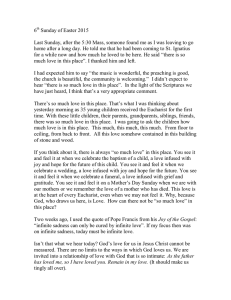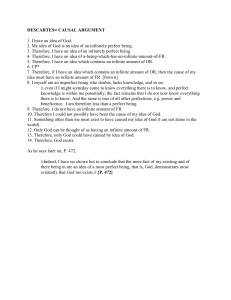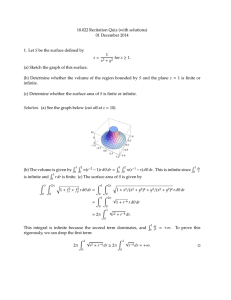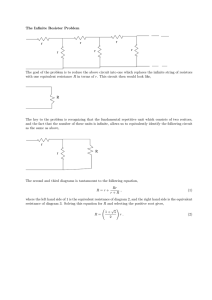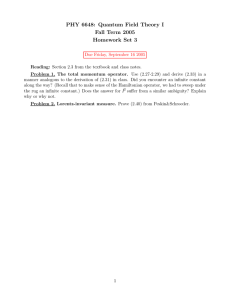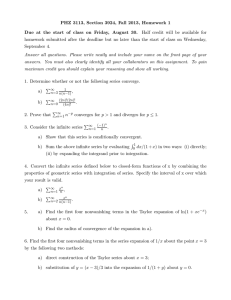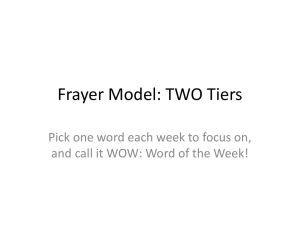4 Sunday of Easter 2015 Fr. Robert VerEecke, S.J.
advertisement
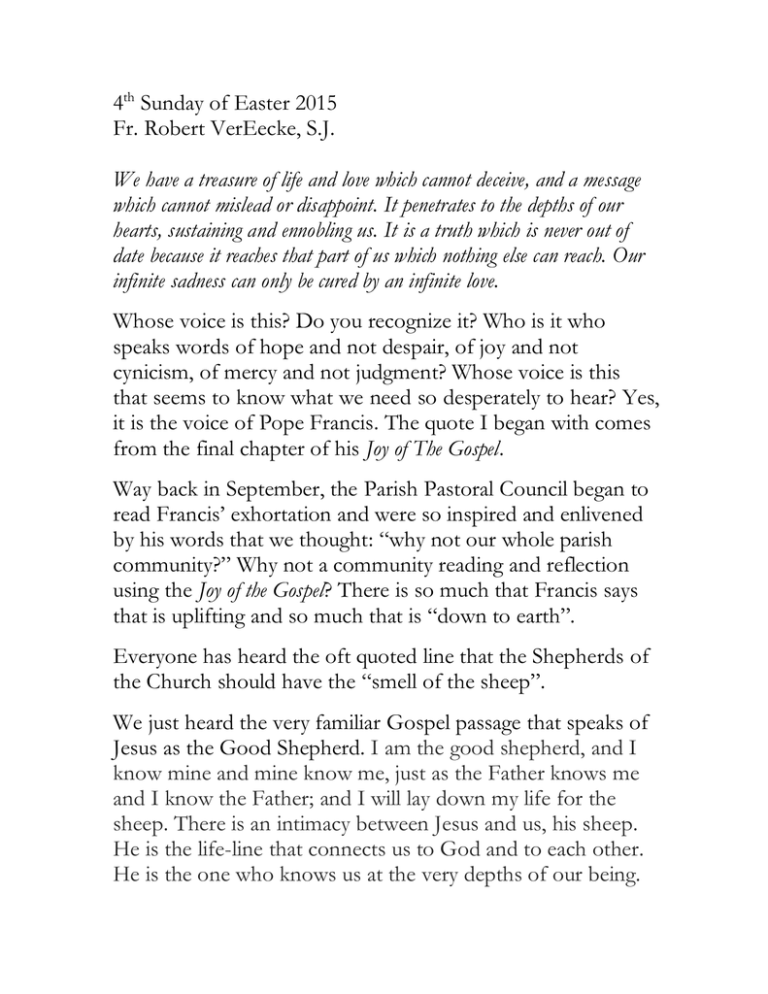
4th Sunday of Easter 2015 Fr. Robert VerEecke, S.J. We have a treasure of life and love which cannot deceive, and a message which cannot mislead or disappoint. It penetrates to the depths of our hearts, sustaining and ennobling us. It is a truth which is never out of date because it reaches that part of us which nothing else can reach. Our infinite sadness can only be cured by an infinite love. Whose voice is this? Do you recognize it? Who is it who speaks words of hope and not despair, of joy and not cynicism, of mercy and not judgment? Whose voice is this that seems to know what we need so desperately to hear? Yes, it is the voice of Pope Francis. The quote I began with comes from the final chapter of his Joy of The Gospel. Way back in September, the Parish Pastoral Council began to read Francis’ exhortation and were so inspired and enlivened by his words that we thought: “why not our whole parish community?” Why not a community reading and reflection using the Joy of the Gospel? There is so much that Francis says that is uplifting and so much that is “down to earth”. Everyone has heard the oft quoted line that the Shepherds of the Church should have the “smell of the sheep”. We just heard the very familiar Gospel passage that speaks of Jesus as the Good Shepherd. I am the good shepherd, and I know mine and mine know me, just as the Father knows me and I know the Father; and I will lay down my life for the sheep. There is an intimacy between Jesus and us, his sheep. He is the life-line that connects us to God and to each other. He is the one who knows us at the very depths of our being. He knows our hopes, our dreams, our loves, our hurts. He knows our brokenness and, most of all, he knows our need for mercy and healing. He is the one who gathers us into his arms to hold and embrace us especially when we are “infinitely sad”. “Our infinite sadness can only be cured by an infinite love.” Have you ever thought of “infinite sadness”? Something in these words of Pope Francis has transfixed me since I heard them again. This is no fleeting emotion that fluctuates with happiness. This is not a sadness that depends on mood, on how we are feeling because of some disappointment. Infinite sadness describes a state of being where we are completely at a loss as to what to do to make things better. Infinite sadness describes a state of being where we feel as if life is slipping away and all we can do is surrender to the unknown. Infinite sadness must be what the people of Nepal are feeling as they wonder how they can face the future after such a great loss. If you can imagine an ocean of sadness, you only begin to feel the “infinite sadness” that Francis refers to. It is what God must feel when God beholds our world and sees the destruction, the violence that human beings perpetrate on each other. In human terms, it is what we may feel with the loss of a loved one, or the loss of a lifetime of human experience. It is the infinite sadness of a voice that says, “Where did the time go? And what remains for me?” Infinite sadness can only be cured by an infinite love. What makes Francis such a good shepherd is that he really seems to know us, you and me. He knows our human condition. He knows how easy it is to be discouraged and even cynical about what life has to offer. That is why he is constantly urging us to go with our emptiness to Jesus who wants to fill us with his love, go to Jesus with our brokenness who only wants to heal us with his love, go to Jesus with our infinite sadness, go to Jesus who only wants to turn our sadness into joy, our mourning into dancing. What makes Francis such a darn good shepherd is that he is first and foremost a Jesuit who knows that we are created for a relationship of beautiful intimacy with Jesus Christ. He, himself, knows the power and glory of this relationship and urges each of his flock to know the same. In union with Jesus, we seek what he seeks and we love what he loves. In the end, what we are seeking is the glory of the Father; we live and act “for the praise of his glorious grace” (Eph 1:6). If we wish to commit ourselves fully and perseveringly, we need to leave behind every other motivation. This is our definitive, deepest and greatest motivation, the ultimate reason and meaning behind all we do: the glory of the Father which Jesus sought at every moment of his life. As the Son, he rejoices eternally to be “close to the Father’s heart” (Jn 1:18). Even when we are feeling infinitely sad because of the world’s worries or our own personal losses, we are close the heart of Jesus, we are close to the Father’s heart.
